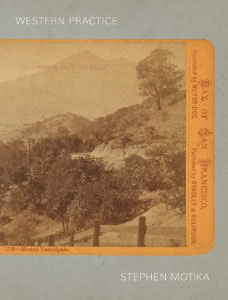
I first came to know Stephen Motika via his partner, who was a friend of mine in grad school at SUNY Buffalo, and who a decade-and-a-half later runs an exciting new gallery in New York City. When I met Motika, he had recently become the program director at Poets House, where he oversees one of the most pertinent and wide-ranging poetry event schedules in the country. He was simultaneously getting an MFA at Brooklyn College and helping run Nightboat Books. As evidenced by his first book, Western Practice, he’s also been spending a significant amount of time researching and traveling.
Alice James Books has done a beautiful job producing Western Practice: square format, French flaps, off-white paper, wraparound archival cover image, and generous spacing in the typesetting. In fact, the initial impression one has while reading through the book is how carefully each poem coordinates the space of the page. Western Practice roots itself in the landscape and history of California. Nearly every poem is located in a specific place, many of them by name: San Francisco, Santa Barbara, Big Sur, Santa Ana, as well as streets, parks, and wildernesses. There’s a constant mapping quality, but one that stops to get lost in California’s rich natural and cultural phenomena: “marbled columbarium / fern plantings / Olmstead fountains.”
Western Practice contains two long serial poems: the first is dedicated to the work of maverick modernist composer Harry Partch (combining biography with musicology), while the second is a kind of collaged documentary history of Los Angeles from 1955 to 1977 (from Walter Hopps’s gallery exhibiting postwar Los Angeles art, to Charles Burnett’s groundbreaking film of everyday African American life, Killer of Sheep). These pieces attempt to capture some of California’s complex cultural and political histories by speaking to, though never for, a variety of subject positions. In contrast, single poems track an individual consciousness moving through urban and rural geographies. In the prose poem “Tea Palinode (18th & Sanchez),” Motika writes: “Lost to sweep of Queen Anne’s lace and leaflets, our errant grip slips, slack. Wrapped in English, sleep exhumed a theory at map’s edge, cast in ornament, artifice, my tongue an observer.” At one time, this might have been called psychogeography or even an ethnoscape. As the economic and environmental pressures mount against the entire planet, now it’s closer to survival.
Alan Gilbert is the author of the poetry collections The Everyday Life of Design (Studio, 2020), The...
Read Full Biography

